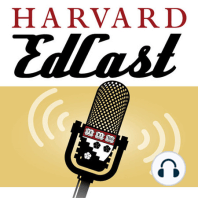18 min listen
The Nature of Imagination
ratings:
Length:
29 minutes
Released:
Oct 26, 2022
Format:
Podcast episode
Description
Children's imaginations are complicated and impressive, says Harvard Professor Paul Harris. Yet, often times, when we watch children pretending, we write it off as fantasy or child's play. What are educators and parents missing in those moments? How can adults be better informed about the nature of children's thinking? From how children mimic reality while pretending to why children develop fears to how they differentiate between make believe and what we tell them, Harris' decades of research demystifies children's thinking. In this episode, Harris takes us on a journey through children's imaginations and contemplates how educators and parents can better use children's imaginations for learning.Share this episode with your networks! Use #HarvardEdCast and tag HGSE on any social media channel.Twitter: @HGSE Instagram: @harvardeducationFacebook: @HarvardEducationLinkedIn: Harvard Graduate School of EducationTikTok: @harvardeducation
Released:
Oct 26, 2022
Format:
Podcast episode
Titles in the series (100)
Teaching AIDS: Three UNESCO HIV education specialists discuss th… by The Harvard EdCast
